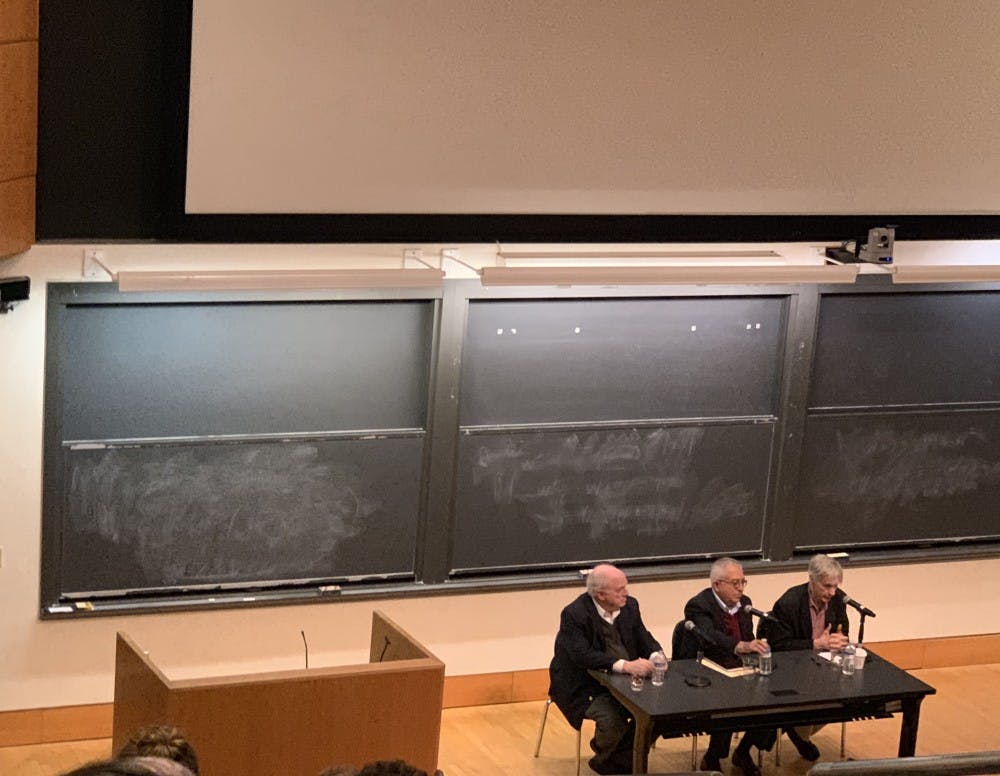“This is very much an election that’s a referendum on Netanyahu,” said Professor Daniel C. Kurtzer, former U.S. ambassador to Israel and Egypt, less than two weeks before the April 9 election of the 21st Israeli Knesset.
“Has he stayed too long? Is he perceived to be beyond the point at which Israelis are ready to give him another mandate? And perhaps most importantly in this calculation, are the legal issues that he faces going to come home to haunt him?” he continued.
In the March 28 event, “Up to the Minute Panel: Implications of the Israeli Elections,” Ambassador Ryan Crocker, former U.S. ambassador to Afghanistan, Iraq, Pakistan, Syria, Kuwait, and Lebanon; Salam Fayyad, former prime minister of the Palestinian Authority; and Kurtzer discussed the upcoming Israeli election and the worldwide effects it could have.
Benjamin Netanyahu, the incumbent Prime Minister of Israel, has served in his current office from 1996 to 1999 and from 2009 to the present. He now faces various legal claims related to bribery and fraud, which caused the Israeli attorney general to recommend indictment.
Kurtzer began with a presentation about the parties and the election system. There are 42 parties running in the election. In order to be elected to the Knesset, the Israeli parliament, each party needs approximately 3.25 percent of the vote, he explained.
Kurtzer described Israel’s political ideologies as having shifted toward the right.
“This is a phenomenon that’s been ongoing for the last more than 20 years,” he said.
Kurtzer also emphasized the influence of the United States in the Israeli election.

“Trump is clearly voting Netanyahu,” he said. “The decision just the other day to have the United States recognize Israel’s sovereignty over the Golan Heights is not only an election gift to Netanyahu, but is a phenomenal change in America’s approach to international law.”
Kurtzer proceeded to discuss the 13 varied political parties that could win seats in the election. Likud, Netanyahu’s party, opposes a Palestinian state. Meanwhile, an opposing party, Meretz, supports a two-state solution and increased minority rights.
Fayyad said it is not likely that the next elected party will support Palestine.
“A meaningful political process with us Palestinians in a way that could lead to resolution of conflict can happen only if a platform like Meretz’s were to be the platform of the next government,” Fayyad said.

Crocker explained his perspective as a former ambassador to several other countries in the Middle East, claiming that Israeli elections are far from the top concern for other countries in the region.
“The region is immersed in a turbulence [that] is quite without precedence in modern times,” he said. “The Arab region is focused on itself. It’s also focused on external threats, in which Israel does not figure prominently.”
“The Saudis are not losing sleep over who is going to emerge in this election in Israel. They are losing sleep over what’s going on in Iraq,” Crocker continued.
All three panelists recognized the important policy and political interactions between Israel and the United States.
“As much as Trump has been supportive of Netanyahu, Netanyahu has been supportive of Trump and the Republican Party for several years. It didn’t start with Trump,” Kurtzer said.
Kurtzer also elaborated on the debate Israel has caused in American politics.
“This has caused a great deal of concern in the American Jewish community, which is divided on this question on how a bipartisan issue of supporting Israel has become part of our partisan politics,” he said.
“You can see it in the way in which the Democratic Party is confronting some of the younger members, Ilhan Omar and Rashida Tlaib and others who are raising questions about Israel that have not been raised before, and providing fodder for the Republicans to argue that the Democrats are no longer supportive of Israel,” Kurtzer continued.
Crocker then explained how the United States could affect Israeli policy.
“One impact I think [the U.S. position] has had is it may embolden further those in Israel who would seek formal annexation [of] the West Bank or at least parts of the West Bank,” he said.
Kurtzer also described Netanyahu’s various legal troubles, which he believed would not have a substantial impact on the election.
“If you followed the legal issues that Netanyahu’s been facing, it appeared for some time that he was going to be in enough trouble that he might not be able to stand for election, and now it appears that he’s going to stand and maybe even come back,” he explained.
The reason for Netanyahu’s resilience, Kurtzer explained, was that the public has not expressed extreme opposition toward him.
“As far as the public is concerned, there’s been no big outcry,” Kurtzer said. “There have not been demonstrations or major reflections of societal concern that you could measure as a form of opposition.”
The event took place on Thursday, March 28, at 4:30 p.m. in Friend 101.








